
News |
- Experimental Lakes Area Science To End
- Canadian Environment Commissioner Slams Government
- New Drinking Water Well Rules, Fracking Okay?
- Romantic Water Notions Not Reality Based
- NTREE & IEA Sound Climate Warnings
- UN Envoy In Winnipeg
- Black Out Speak Out: June 4, 2012
- Yinka Dene Freedom Train Challenges Enbridge
- Treaty Two Nations Caution on Bipole III
- Biofuel Bust: No Plant for Portage la Prairie
- Budget Act Kills Environmental Protection
- Arctic Ocean Changing As Ice Disappears
| Experimental Lakes Area Science To End | 25 May 12 |
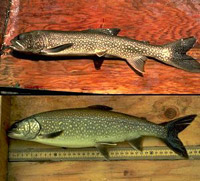 Canadian government budget cuts to the Department of Fisheries and Oceans and recent letters to staff and scientists mean the Experimental Lakes Area in East of Kenora in south west Ontario will be closed. The out door lakes lab project started 44 years ago. Fifty eight small lakes ecosystems are used for real world experiments, with the results applied to policy, science treaties and regulatory frameworks. Canadian government budget cuts to the Department of Fisheries and Oceans and recent letters to staff and scientists mean the Experimental Lakes Area in East of Kenora in south west Ontario will be closed. The out door lakes lab project started 44 years ago. Fifty eight small lakes ecosystems are used for real world experiments, with the results applied to policy, science treaties and regulatory frameworks."We use these lakes the way medical researchers use white mice," says Mike Paterson, the scientist-in-charge at the ELA. Research from the Experimental Lakes Area, based on laboratory analyses, has had profound impact on environmental policy across North America. In the 1970s, work at the ELA led to an almost world wide ban on dish detergent containing phosphorous. During the1980s, ELA scientists proved harmful effects of acid rain, which led to new standards for airborne pollutants., and cooperation between Canada and the US to reduce acid rain effects. The Experimental Lakes Area research is invaluable in demonstrating environmental impact of chemicals in water ecosystems. Hundreds of scientists and students have been involved in aquatic and ecosystem research at the ELA. Much of the work from the ELA has been centred in the Fresh Water Institute in Winnipeg, Manitoba. View May 19, 2012 Winnipeg Free Press editorialView May 17, 2012 The Globe and Mail article View May 19, 2012 iPolitics article View May 18, 2012 Manitoba Wildlife Federation blog post View May 18, 2012 Winnipeg Free Press article View August 17, 2008 Winnipeg Free Press article View May 23, 2012 The Tyee article View media coverage on Save ELA website |
|
 Print version Print version |
Top |
| Canadian Environment Commissioner Slams Government | 18 May 12 |
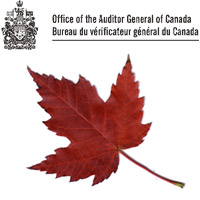 Scott Vaughan, Canada Commissioner of the Environment and Sustainable Development, released a report highly critical of the Canadian Government May 8, 2012.
Scott Vaughan, Canada Commissioner of the Environment and Sustainable Development, released a report highly critical of the Canadian Government May 8, 2012.The Commissioner's main findings were:
"I have grave concerns. Climate change is about a moral responsibility, intergenerational responsibility, and under the Kyoto Protocol Implementation Act, they also had legal responsibility. Under the Budget Implementation Bill, they're going to repeal that," said Liberal Environment Critic Kirsty Duncan. "Without an implementation plan, industry, consumers and other levels of government lack a solid basis for knowing how to adjust technology and make formal investment decisions," said Vaughan. NDP Environment Critic Meagan Leslie said "It's pretty unbelievable for the Conservatives to say they will ditch one plan, say, 'We're going to do it sector by sector, we have a plan, the plan is working.' It's very clear the plan is not working." "We cannot ignore environmental liabilities, whether due to the climate crisis or toxic waste sites. Economic health is completely dependent on ecological health," said Green Party Leader Elizabeth May. View May 8, 2012 Office of the Auditor General: Environment Commissioner press releaseView May 8, 2012 Office of the Auditor General: Environment Commissioner report View May 8, 2012 CBC News article View May 8, 2012 Global News coverage View May 8, 2012 Toronto Star coverage View May 8, 2012 Macleans.ca coverage View May 14, 2012 Hill Times coverage View Manitoba Wildlands Climate Change: Canada Initiatives page Source:
Environment Commissioner, Hill Times
|
|
 Print version Print version |
Top |
| New Drinking Water Well Rules, Fracking Okay? | 18 May 12 |
 Manitoba Conservation & Water Stewardship Minister Gord MackIntosh introduced The Groundwater And Water Well And Related Amendments Act to the Legislature May 15, 2012.
Manitoba Conservation & Water Stewardship Minister Gord MackIntosh introduced The Groundwater And Water Well And Related Amendments Act to the Legislature May 15, 2012.The proposed Act "puts in place new protections for water wells, specifically looking at qualifications for well drillers as well as protections in terms of the drilling and sealing of wells, and as well, formally recognizes in legislation the important role of aquifer management planning," said MackIntosh. Manitoba released a discussion paper on the proposed legislative changes in March and requested public comments online. Comments received have not been made public, and the discussion paper is no longer available on the Government of Manitoba webpage dedicated to the proposed New Groundwater Act and Strategy. "This Government needs to understand that simply putting a discussion paper up on a website is not consultation. The comments received need to be shared in an open and transparent manner, and greater efforts need to be made to engage the public," suggested Manitoba Wildlands Director Gaile Whelan Enns. Whelan Enns also pointed out that new act deals only with drinking water wells. Wells drilled under the Manitoba's Mines and Minerals Act and/or Oil and Gas Act are specifically excluded from the new well rules. "Fracking is one of the biggest current risks to the safety of our aquifers," said Gaile Whelans. "If this government wants to get serious about aquifer management planning, then it needs to address the impacts that fracking has on water quality." View Bill 25: The Groundwater And Water Well And Related Amendments ActView May 16, 2012 Winnipeg Free Press coverage View May 15, 2012 Legislative Assembly of Manitoba Hansard (Transcript of Debates) View May 15, 2012 Government of Manitoba press release View March 22, 2012 Government of Manitoba press release View Government of Manitoba New Groundwater and Water Well Act and Groundwater Strategy Proposed website View Manitoba Wildlads Reality Check: Do Manitoba and Canada Have Public Consultation Standards? View Manitoba Wildlads Reality Check: Is Fracking Happening in Manitoba? View March 30, 2012 Manitoba Wildlands news item View Manitoba Wildlands Manitoba Water Initiatives page Source:
Government of Manitoba
|
|
 Print version Print version |
Top |
| Romantic Water Notions Not Reality Based | 18 May 12 |
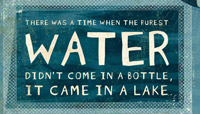 The fifth annual Royal Bank of Canada (RBC) Canadian Water Attitudes Study, conducted by international research consultancy GlobeScan shows that Canadians believe maintaining our drinking water supply is one of the most important areas for government funding (behind hospitals and tied with schools). The survey also finds water related issues has inconvenienced more than half of Canadians in the past two years.
The fifth annual Royal Bank of Canada (RBC) Canadian Water Attitudes Study, conducted by international research consultancy GlobeScan shows that Canadians believe maintaining our drinking water supply is one of the most important areas for government funding (behind hospitals and tied with schools). The survey also finds water related issues has inconvenienced more than half of Canadians in the past two years.Yet the same survey shows a disconnect: more than 80 per cent feel there is no need for major and immediate investment in their community's drinking water/wastewater facilities. The level of confidence in the safety and quality of drinking water has increased, and more than a third of Canadians (37 per cent) who use municipal water are not very aware of the condition of the water and sewage infrastructure serving their own home. "We have been polling on water issues for 25 years. This survey is a tale of romance between Canadians and their treasured water. But there's a significant gap between romance and reality. We found a troubling lack of awareness not only about water conservation but also the very pressing need for investment in infrastructure." stated GlobeScan President Chris Coulter. View March 22, 2012 2012 RBC Canadian Water Attitudes Study Fact Sheet (PDF)View March 22, 2012 2012 RBC Canadian Water Attitudes Study Infographic (PDF) View March 22, 2012 Globe Scan press release View March 16, 2012 Royal Bank of Canada press release View Water for Life Decade (2005-2015) project website View Manitoba Wildlands Water page |
|
 Print version Print version |
Top |
| NTREE & IEA Sound Climate Warnings | 11 May 12 |
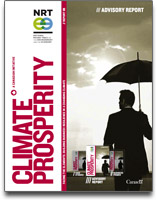 An April 27, 2012 report, "Building Business Resilience in a Changing Climate," from the soon-to-be-defunct National Round Table on the Environment and the Economy (NTREE) warns that both business and government are woefully unprepared for the inevitable effects of climate change.
An April 27, 2012 report, "Building Business Resilience in a Changing Climate," from the soon-to-be-defunct National Round Table on the Environment and the Economy (NTREE) warns that both business and government are woefully unprepared for the inevitable effects of climate change."We say climate change is a material risk," David McLaughlin, head of the NTREE advisory panel. Previous analysis done by the round table shows that climate change will drain $5 billion a year from the Canadian economy by 2020. The costs will climb steeply after that, chopping Canadian economic activity by between $21 billion and $43 billion a year by 2050, depending on how much action is taken to reduce greenhouse gases by then. At the same time a April 23, 2012 report, "Tracking Clean Energy Progress," by the International Energy Agency (IEA) says governments around the world must "level the playing field" to ensure clean energy technologies grow fast enough to prevent dangerous levels of global warming. "Transition to a low-carbon energy sector is affordable and represents tremendous business opportunities, but investor confidence remains low due to policy frameworks that do not provide certainty and address key barriers to technology deployment. Private sector financing will only reach the levels required if governments create and maintain supportive business environments for low-carbon energy technologies," says the IEA report. View April 27, 2012 NTREE reportView April 23, 2012 IEA report View April 27, 2012 Canadian Business coverage View April 25, 2012 Postmedia coverage View Manitoba Wildlands Addressing Climate Change page Sources:
Postmedia, Canadian Business, NTREE, IEA
|
|
 Print version Print version |
Top |
| UN Envoy In Winnipeg | 11 May 12 |
 The United Nations Special Rapporteur on the Right to Food, Olivier De Schutter, arrived in Winnipeg May 11, 2012.
The United Nations Special Rapporteur on the Right to Food, Olivier De Schutter, arrived in Winnipeg May 11, 2012.De Schutter, a Harvard-educated human rights lawyer who investigates and makes recommendations on food issues, is in the midst of an 11-day cross Canada visit to examine: rising food bank use, whether all Canadians have "adequate, accessible and affordable" sustenance, and the need for national Canadian food policies. "Having the UN Special Rapporteur come to Winnipeg to discuss the right to food among Canadians is an honour," said Jasmine Tara, Winnipeg North End Food Security Network Coordinator. In addition to Winnipeg De Schutter will visit Sagkeeng First Nation, God's River First Nation, Garden Hill reserve, as well as fly over the Lake St. Martin area, where prolonged flooding has forced the evacuation of hundreds of reserve residents. "What the rapporteur is going to see is a transition phase where we're relying less on a traditional diet and more on processed, less healthy food. Where I come from at Pine Creek First Nation, there are no fish left in the lake and there is no moose to hunt on the mountain. We have to make our purchases at the grocery store just like everyone else," said Assembly of Manitoba Chiefs Grand Chief Derek Nepinak. MKO Cree Northern Grand Chief David Harper said he hopes the envoy will get a feel for the high cost of groceries. Groceries in remote Northern community stores cost at least twice as much as in Winnipeg. "Challenges remain to ensure that food is adequate, accessible and affordable for marginalized groups, be they poor urban populations or Aboriginal peoples," De Schutter said. View May 11, 2012 Assembly of Manitoba Chiefs press releaseView May 11, 2012 Winnipeg Free Press coverage View May 11, 2012 Winnipeg Sun coverage View May 4, 2012 Montreal Gazette coverage View April 26, 2012 Winnipeg Free Press coverage View United Nations Office of the High Commissioner for Human Rights Special Rapporteur on the Right to Food View May 17, 2012 Indigenous Peoples Issues & Resources article Sources:
Winnipeg Free Press, Montreal Gazette
|
|
 Print version Print version |
Top |
| Black Out Speak Out: June 4, 2012 | 11 May 12 |
 Environmental-Charities say "silence is no longer an option" after much of the 2012 Canadian budget implementation act focuses on weakening environmental laws, environmental assessments, and making it more difficult for environmental charities to participate in the public policy process.
Environmental-Charities say "silence is no longer an option" after much of the 2012 Canadian budget implementation act focuses on weakening environmental laws, environmental assessments, and making it more difficult for environmental charities to participate in the public policy process.In response environmental charities, including David Suzuki Foundation, Ecojustice, Environmental Defence, Equiterre, Greenpeace, Nature Canada, CPAWS, Pembina Institute, Sierra Club Canada, West Coast Environmental Law, and WWF Canada have launched a major campaign to defend nature and democracy called: "Black Out Speak Out." On June 4th, 2012 organizations, businesses and citizens from across Canada will blackout their websites in protest against efforts to silence Canadians and undermine environmental laws. "The attacks on environmental charities and gutting of environmental review processes aim to silence Canadians of all sectors and many backgrounds who participate in decision-making about large-scale industrial developments," said Peter Robinson, CEO of the David Suzuki Foundation. "This is not only undemocratic-it will undermine the government's ability to make sound policy decisions and to protect the environment." "We are compelled to speak out and we're inviting Canadians from all walks of life to join us.", said Sidney Ribaux, executive director of Equiterre. Over the next four weeks, environmental groups will build support for the campaign, inviting other organizations, community and social justice groups, and individuals from across Canada to join them in expressing their concern about this erosion of core Canadian values. Canadians wishing to support the campaign can sign up at blackoutspeakout.ca View Blackout Speakout websiteView May 6, 2012 Blackout Speakout press release View May 7, 2012 Globe and Mail advertisement Watch May 4, 2012 CBC News Power & Politics video coverage View May 4, 2012 CBC News coverage View May 5, 2012 Montreal Gazette article View May 6, 2012 CBC News article View May 6, 2012 Sierra Club Canada press release View May 6, 2012 Sierra Club Canada blog post View May 6, 2012 The Globe and Mail article View May 7, 2012 CTV News article View May 7, 2012 Environmental Defence blog post View May 7, 2012 Nature Canada blog post View May 9, 2012 Huffington Post article View May 10, 2012 Huffington Post article View May 10, 2012 David Suzuki Foundation article Source:
Blackout Speakout
|
|
 Print version Print version |
Top |
| Yinka Dene Freedom Train Challenges Enbridge | 4 May 12 |
 The Yinka Dene Alliance (YDA) Freedom Train to stop Enbridge's Northern Gateway Pipeline is in Winnipeg May 3rd to May 6th on its way to Enbridge's AGM on May 9th. The Yinka Dene Alliance group of First Nations traditional lands comprise a full twenty-five percent of the planned path for Enbridge's Northern Gateway Pipeline. YDA has officially banned the Northern Gateway Pipeline in their traditional territory using their traditional laws. Never having given up their sovereign rights as nations, YDA First Nations are using the Freedom Train to raise awareness about their use of their laws to enforce their ban on the Enbridge Northern Gateway Pipeline. Others are boarding the train as it travels across Canada.
The Yinka Dene Alliance (YDA) Freedom Train to stop Enbridge's Northern Gateway Pipeline is in Winnipeg May 3rd to May 6th on its way to Enbridge's AGM on May 9th. The Yinka Dene Alliance group of First Nations traditional lands comprise a full twenty-five percent of the planned path for Enbridge's Northern Gateway Pipeline. YDA has officially banned the Northern Gateway Pipeline in their traditional territory using their traditional laws. Never having given up their sovereign rights as nations, YDA First Nations are using the Freedom Train to raise awareness about their use of their laws to enforce their ban on the Enbridge Northern Gateway Pipeline. Others are boarding the train as it travels across Canada.Yinka Dene Alliance was a leading creator of the Save the Fraser River Declaration signed by almost 200 First Nations in solidarity to protect the environment of their traditional lands. Representatives of the Yinka Dene Alliance will attend Enbridge's Annual General Meeting in Toronto, Ontario to enforce their ban of the construction of pipelines in their traditional territories. "We're travelling across Canada to tell Enbridge that they will not be permitted to build their pipelines through our lands, period,” said Chief Jackie Thomas of Saik'uz First Nation. "The fight against Enbridge is a fight for our freedom to govern ourselves and to choose our own future. We will not accept the government imposing a decision on us and forcing this pipeline through our lands.” View April 24, 2012 Yinka Dene Alliance news releaseView Yinka Dene Alliance Backgrounder View Save the Fraser Declaration website View May 2, 2012 BC Metis Federation View May 3, 2012 CBC News article |
|
 Print version Print version |
Top |
| Treaty Two Nations Caution on Bipole III | 4 May 12 |
 Treaty Two First Nations have written Manitoba Premier Greg Selinger to caution against the use of their territory for Manitoba Hydro's proposed Bipole III project, reminding the Premier of his constitutionally mandated duty to consult with First Nations.
Treaty Two First Nations have written Manitoba Premier Greg Selinger to caution against the use of their territory for Manitoba Hydro's proposed Bipole III project, reminding the Premier of his constitutionally mandated duty to consult with First Nations.During a council held at Ebb & Flow Reserve April 26, 2012 seven of the nine Treaty Two First Nations decided to take a united collective treaty-based approach to questions regarding the proposed Bipole III project. Treaty Two was signed in 1871 explicitly for the purposes of "obtaining consent" of the indigenous peoples for the sharing of their lands for purposes "of immigration and settlement." "Bipole III goes far beyond the permission given through Treaty," because it is being built primarily to export power stated Treaty Two co-chairs Chief Norman Bone of Keeseekoowenin Objibway Nation and Chief Barry Swan of Lake Manitoba First Nation in their letter to the Premier. View April 26, 2012 Annishaabe Agowidiiwinan (Treaty Two) press releaseView May 2012 Skownan First Nation article Source:
Annishaabe Agowidiiwinan
|
|
 Print version Print version |
Top |
| Biofuel Bust: No Plant for Portage la Prairie | 4 May 12 |
 Shell Canada has cancelled plans for a cellulose ethanol plant in Portage La Prairie, Manitoba. Plans at an Ottawa based Iogen Energy Corporation cellulose ethanol demonstration plant, with Shell Canada as partner, have also been scaled back.
Shell Canada has cancelled plans for a cellulose ethanol plant in Portage La Prairie, Manitoba. Plans at an Ottawa based Iogen Energy Corporation cellulose ethanol demonstration plant, with Shell Canada as partner, have also been scaled back.Unless cellulose ethanol can command a price premium for any greenhouse gas (GHG) reductions achieved, then regardless of Manitoba ethanol mandates, suppliers are likely to choose the lower cost and higher emitting first-generation ethanol fuels. Shell Canada Environmental and Regulatory Affairs Advisor Ed Brost indicated Shell had planned to apply for a Manitoba Environment Act license for the plant in late summer or early fall 2012. The plant would have created 70-100 jobs, and more than 300 farmers had already signed up to supply the facility with straw. Brost said there was "no plans to restart the project," and that the decision to scrap the plan was a business decision, which "had nothing to do with anything in Manitoba. Both the Province and the community were receptive and generally supportive of Shell during the feasibility study. Shell appreciates the time and effort of all those who offered support and suggestions during the study." View May 1, 2012 Ottawa Citizen articleView April 30, 2012 Shell Canada press release View April 30, 2012 Globe and Mail coverage View April 30, 2012 Winnipeg Free Press coverage View April 30, 2012 Reuters coverage View more on Manitoba Wildlands Addressing Climate Change page Source:
Shell Canada, Globe and Mail, Ottawa Citizen
|
|
 Print version Print version |
Top |
| Budget Act Kills Environmental Protection | 27 April 12 |
 The Government of Canada introduced "Bill C-38: An Act to implement certain provisions of the budget tabled in Parliament on March 29, 2012 and other measures" April 26, 2012.
The Government of Canada introduced "Bill C-38: An Act to implement certain provisions of the budget tabled in Parliament on March 29, 2012 and other measures" April 26, 2012.About one-third of the budget implementation bill changes environmental legislation, instead of dealing with fiscal matters as a budget implementation bill does in the Canadian System. Non-budgetary environmental changes in Bill C-38 include:
First Nations are also deeply concerned about being left out of the new procedures, despite legal obligations on the government to consult First Nations on impacts from major projects. "It is an alarming development that Canada would take such steps," said Shawn Atleo, National Chief of the Assembly of First Nations. View Bill C-38: An Act to implement certain provisions of the budget tabled in Parliament on March 29, 2012 and other measuresView April 27th, 2012 West Coast Environmental Law Association View April 26th, 2012 Ecojustice coverage View April 27, 2012 Globe and Mail coverage View April 26, 2012 CBC coverage View April 26, 2012 Vancouver Sun coverage View April 26, 2012 Edmonton Journal coverage View April 26, 2012 Hill & Knowlton Strategies coverage View April 13, 2012 Manitoba Wildlands news item View July 21, 2010 Manitoba Wildlands news item View May 12, 2010 Manitoba Wildlands news item View March 10, 2009 Manitoba Wildlands news item View Manitoba Wildlands Economic Development page Source:
CBC, Huffington Post, Hill & Knowlton Strategies
|
|
 Print version Print version |
Top |
| Arctic Ocean Changing As Ice Disappears | 27 April 12 |
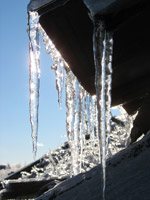 A recent $40 million all season study, conducted by ten teams from 27 countries was presented at the Polar Year Conference in Montreal in late April 2012. Teams studied open water along breaks in multi-year ice shelves, or what are called flaw leads to determine what effect global warming is having on the Arctic Ocean.
A recent $40 million all season study, conducted by ten teams from 27 countries was presented at the Polar Year Conference in Montreal in late April 2012. Teams studied open water along breaks in multi-year ice shelves, or what are called flaw leads to determine what effect global warming is having on the Arctic Ocean."The Arctic Ocean is definitely changing on a whole lot of different fronts," professor David Barber of the University of Manitoba said. Scientist discovered that an increase in open water is dramatically affecting the carbon cycle and creating underwater 'storms' that impact the flow of flora and fauna into the Arctic Ocean. The study is the first of its kind and comes at a time when Canadian Government funding for Arctic research is being slashed. With more open waters making the Arctic Ocean more accessible each year concerns are being raised about economic buffer zones, security risks, and resources newly accessible, especially fishing. A group of more than 2,000 scientists from around the world are urging the leaders of all five Arctic nations to impose a moratorium on industrial fishing. With so little still known about the Arctic Ocean, Arctic leaders are being asked to develop an accord to ensure sustainability of Arctic fishing grounds. View April 27, 2012 Canada.com articleView April 25, 2012 Montreal Gazette article View April 24, 2012 Montreal Gazette article View April 23, 2012 Montreal Gazette article Source:
Montreal Gazzette
|
|
 Print version Print version |
Top |


 RSS Feeds:
RSS Feeds: